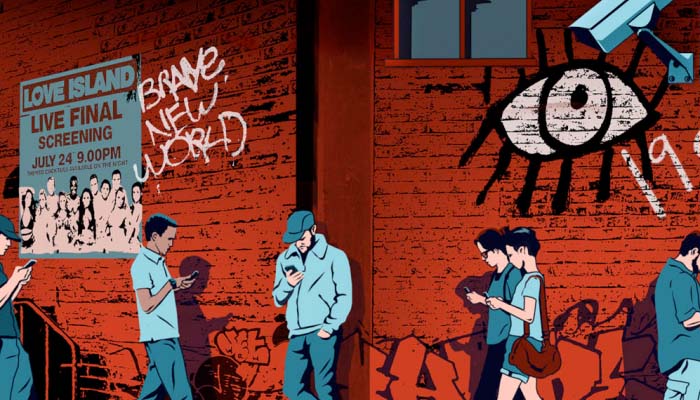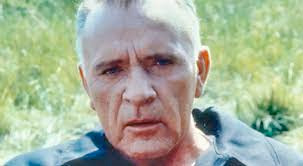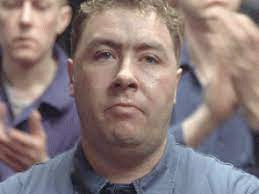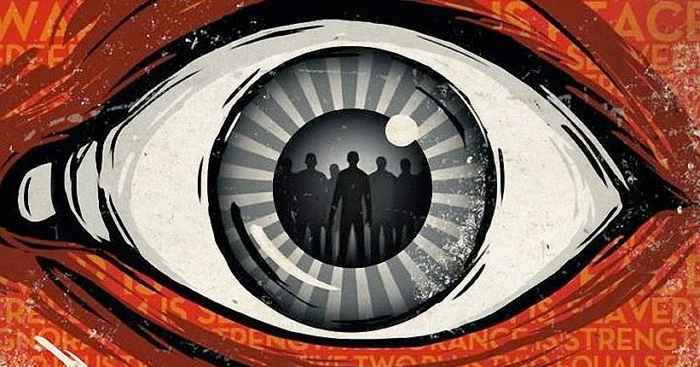1984: What Does it Tell us About The Purpose of Life?

“1984” by George Orwell is a book about finding one’s truth and fighting for it. It displays a world where everyone searches for their version of truth when all the facts are controlled by “The Party.” Winston is a freedom loving individual living in Oceania. Oceania is ruled by “The Party,” which controls every aspect of life. Specifically, the inner party controls all thoughts, actions, and facts in Oceania. There also exists the “Outer Party,” servants of the inner party, and “The Proles,” voiceless individuals who simply live. The Proles find meaning in enjoying small pleasures. With their low intellect, this simplicity becomes their truth and fuels their purpose. On the other hand, the party members are infatuated with “Big Brother.” This figure created by the inner party is the only thing they are allowed to harbor emotions for. Thus, it is loved by the party members. Feeling fulfilled by being of use to their loved one, the party members devote their lives to “Big Brother.” They search for morality through it. Therefore, they strive for Big Brother’s gain even at the cost of betraying their parents. To them, “Big Brother” is their truth.
Winston, however, starts the story as the only outer party member who hates the party and “Big Brother.” Winston, wanting freedom, searches for clues of a different past. It gives him goals to make society better than the present, where freedom is oppressed. He finds hope in a greater future’s possibility by finding evidence of a freer past. Freedom is Winston’s truth, and on his quest for it, he meets friends, faces captivity and torture, and suffers through betrayal. The book 1984 displays the various truths of its characters and exemplifies their struggles when sticking to them.

Quotation Analysis
There are several passages throughout the story that illustrate the concept of standing up for your truth. A clear demonstration of this would be Winston’s statement, ‘‘If you can FEEL that staying human is worthwhile, even when it can’t have any result whatever, you’ve beaten them’’ (Orwell, 210) from Winston completely displays this. Winston feels that to be human is to be free.
When seen from Winston’s perspective—that humans are those who are free to think for themselves—this quote demonstrates that holding on to your own free, self-generated truth implies that you have ended up winning. It demonstrates that in order to experience a sense of purpose in life, it is essential for you to strongly feel that it is worthwhile to follow your truth.
Additionally, the quote, “I hate purity, I hate goodness! I don’t want any virtue to exist anywhere. I want everyone to be corrupt to the bones” (Orwell 158) shows Julia’s truth. Julia is a character who loves freedom and hates the ideals of the party which restrict it, this being described as “purity” in Julia’s perspective. Julia strays from this defined purity because it gives her purpose as one who lives as an individual, even when everyone else lives as a tool. This quote shows Julia’s truth and her fight against society in her struggle to stick to it.
Finally, the quote “Do you know what I’m going to say to them when I go up before the tribunal? “Thank you,” I’m going to say, “thank you for saving me before it was too late.” (Orwell, 295) displays the excessive impact of Parsons’ truth on his life. Parsons regrets betraying “Big Brother,” and he even feels proud of his daughter for sending him to captivity for this reason. “Big Brother” is Parsons’ truth that cures him of his loneliness when even his daughter does not care for him. Thus, this quote is significant in its point showing Parsons’ willingness to sacrifice himself in order to stick by his truth.
Character Representations
The characters in this book also emphasize the purpose of life displayed by the book. First, O’Brien is a key example of this. O’Brien is an inner party member who is extremely intelligent and ambitious. He has a firm belief in power, and greatly desires to stay in power. Power is O’Brien’s truth. He finds self-worth in it. This is because it gives him security. Being in power means that he is capable of thinking for himself. He finds that if he loses power, he will become like the constantly oppressed “lows” of society. Thus, he does anything, from betraying Winston to torturing him until he is brainwashed, to ensure that he has the grasp of power he seeks.

Another example of a character emphasizing the theme of sticking to and fighting for one’s truth is Parsons. Parsons is the common party member. He is a fearful and loyal individual who believes “Big Brother” to be a guideline for his morality and a figure for his love. He has complete trust in “Big Brother,” and is morally driven by the party due to this trust. Consequently, he fights for the party to be a “good person” judging by those morals. He feels fulfilled having “Big Brother ” as a figure for his affection. This is because this gives him the impression that he is not alone in a world where nobody cares about him, not even his offspring. For “Big Brother,” Parsons can do anything. His desire to be of use to “Big Brother” causes him to feel as if he needs to do so. This is why he feels gratitude for his imprisonment. These feelings are all due to his fight for his truth.

Reflected in History
Finally, this book’s theme is reflected in the events in our recorded history. For one, it is shown in World War 2 by Hitler’s actions. Hitler killed Jewish people and betrayed Russia for power. These actions were done in his belief of German superiority. He thought that the world would be better under German control. Using this, he justified for himself the disregard for other races’ rights. Thus, he began his plot for world domination. He wanted Germans reigning at the top, whilst all other races lived as slaves, this being similar to the power dynamic between inner and outer party members. His firm belief in biological hierarchy led him to his cruel acts such as starting World War 2, betraying his allies, and persecuting Jews. Although cruel and horrendous, this was his way of fighting for his truth. His actions completely portray the extent to which one can go in their fight for truth. The fight for truth can, in this sense, be a guideline for one’s life. The case with Hitler and the party members shows that one must be extremely careful when acting on what they believe, especially seeing how catastrophic not doing so can be.

Another example of this in real-world history is in Martin Luther King Jr.’s speeches. Martin Luther King fought for his belief in equality and freedom. Martin Luther King fought for his truth even though most of society rejected it. His truth of equality of all races gave him hope. He was fueled with the hope that the unfair treatment towards black people could be changed. This is because he believed it should be changed since race did not classify someone as below another.

His convictions inspired him to work toward building a society in which all individuals, regardless of race, could coexist. He fought for this goal through his speeches. He inspired others to think the same as him, and work for change. He was prepared to fight against his whole society in order to align himself with his version of the truth.
Thoughts
“1984” is an excellent book. It portrays an interesting world structure where society is separated into the classes of high, middle, and low. Through these classes, there are many different perspectives brought to the minds of the reader. From existing for an entity to existing for freedom, the characters possess various purposes in their lives. There are great plot twists, descriptions of the main character’s feelings and thoughts, and it is a very realistic book. It shows that one person alone can’t destroy a society which has total control. Winston could not complete that quest.
However, the book also portrays Winston’s struggle for truth and sense of identity. It outlines that even if you never produce results to change society, by accepting your own truth and fighting for it, you can win. The book also explains how society transformed into its current state. It even gave excellent reasons for why it is better the way it currently is. Both the enemy and the protagonist’s perspectives are thoroughly explored. Regardless of what would seem to be an obvious conclusion to agree with Winston’s perspective, readers are capable of at least seeing the other point of view.
Most of all, the narrative of sticking to one’s own beliefs regardless of how others may feel about them is an excellent theme which applies heavily in the real world. Readers witness the story from the villain’s point of view. This is because Winston is certainly the villain in the eyes of his society. However, through our journey with him, we get to see that there is more to something than simply how it appears on the surface. For these reasons, the book “1984” by George Orwell is thoroughly entertaining and an excellent read.

What do you think? Leave a comment.











I love reading Orwell but for some reason not 1984. It is so not Orwell not to get the writing itself right. I find, for instance, Coming Up for Air far more satisfactory where Orwell enters into his chief protagonist, George Bowling, a la Joyce and the book is a homage to Leopold Bloom. At the same time, the book has a sharp message, equally dystopian as 1984. That said, Orwell was at his best in his essays, without a shadow of doubt.
Yes! even Keep the Aspidistra Flying is a better book than 1984. and certainly Coming Up for Air is.
Yep. 1984 is worthy. The essays are much better.
What’s all this dystopian nonsense about Orwell’s 1984? Open your eyes: we have lived 1984 and we are all Thatcherites now; so enough dystopianism, thank you!
1984. The most depressing book I’ve ever read. In my mind’s eye, recalling it, I see dirty tiles as if I’m in a Moscow subway.
Both timely and timeless for over 70 years now. Not many can say that.
In fact, nobody can say that, since “timeless for over 65 years” makes no sense.
sage can say that. nobody else.
Much of the culture of the society depicted in the novel 1984 IS the society we have today. They dont have two way telescreens in every room but the NSA and GCHQ monitor all our emails… A theme of 1984 the novel was the switching sides so the enemy becomes the ally and the ally becomes the enemy without the masses being aware. This IS the world we live in.
A fantastic book that everyone should read. Well ahead of its time.
A truly amazing book. I re-read it last year for the first time in ages, and found it still incredibly powerful and resonant. The scenes in the Ministry of Love between Winston and O’Brien are mesmerising, terrifying and almost endlessly quotable
Indeed: “the object of persecution is persecution. The object of torture is torture. The object of power is power.”
“If you want a vision of the future, imagine a boot stamping on a human face- forever”
The bleakest, most terrifying, most depressing, most utterly pessimistic sentence ever written.
But true.
I heard that the first draft used “plimsoll” instead of “boot”, but it didn’t have the same impact….
One of the few books I pick up and re-read on a regular basis, it terrified me as a child and still does as an adult but in different, subtle ways.
The terror of the fascistic police state, stamping on humanity and filled with nothing but hate is one thing but the very destruction of hope, freedom and liberty as concepts in the human mind is another. The idea that you can be broken in the most personal, fundamental way and rebuilt in your enemies image, only so he can put you up a wall and shoot you anyway is grotesque.
As someone who revised this, it’s great to see how the article changed over time. It’s great to see it live on the site! It definitely made me think!
The only fiction book I read by choice between 12 and 16, back in the 1970s. My school English teacher was trying to make use read ‘Northhanger Abbey’ and ‘Silas Marner’, so ‘1984’ was really a breath of fresh air for a teenage boy.
It’s depressingly true today.
1984 is brilliant in its depiction of life under an autocratic regime and the sheer bleakness of humanity, but is it actually a brilliant novel? I’m not convinced.
What is literature if not a cultural and reflective statement on humanity? The significance of 1984 – what it has to say about the humanity of the time and the humanity of the future – is what makes it a great novel in and of itself.
It was his foresight and the prophetic nature of this book that makes it a great work of literature for me. His predictions are sadly being realised. A great and modest man in my opinion.
1984- nice idea, poorly executed.
One of the most unpleasant, yet best books I have ever read.
Every child should be handed a copy of 1984 on their 13th birthday.
Funny you say that because I DID give it to my son for his 13th birthday. He devoured it in 3 days.
I got him Call of Duty too.
I remember reading this at 13 and being absolutely terrified of it. No book before or since has scared me as much as 1984. Don’t re-read it. I have barely returned to it as it was so bleak.
Orwell – if only they still made them like that.
This extraordinary masterpiece should be compulsory reading in all schools across the world. The novel ‘We’ by Yevgeny Zamyatin should also be read. They are both very hard reading but the terror of them should kick start some brains into action.
We need young people to know that the dystopian future of both these novels is looming out of the darkness of ignorance and complacency that pervades all major societies across the world.
Terribly sad lonely deaths by both authors. I weep for them.
Yeah, I love We.
Always thought that Terry Gilliam’s Brazil was the finest cinematic interpretation of the brilliant Nineteen Eight-Four.
1984 is certainly the most influential novel of the 20th Century or since. I was once asked by a Korean to recommend a book to help improve his English that would grab him. It had to be this one. I love Orwell’s use of the short Anglo Saxon words.
I remember reading it at school in the early-mid 90s and being asked to compare it to Brave New World and also being asked which was the most likely to come true. This was not long after the fall of the Soviet Union, the ‘end of history’, and also the era of Clinton, Maastricht, the WTO, DNA testing, rave culture and an inchoate internet. 1984 suddenly seemed anachronistic in its overtly brutal militarism of knocks on the door and perpetual war, Brave New World far more subtle and prescient in its prediction of a world state and virtually invisible population control via unbounded production and technological advance.
Fast-forward a couple of decades and we see militarised police forces across the west suppressing protest, western intelligence services placing entire populations under surveillance, people arrested and sent to prison for sending Tweets, a return of conflict between large regional power blocks, possible financial collapse – suddenly it’s 1984 that doesn’t seem all that far away and Brave New World that seems slightly absurd in its confidence in science and human desire to unite.
The fact that you were studying and contrasting ‘Brave New World’ with ‘Nineteen Eighty Four’ in the 1990’s is also testament to the truth of both of these novels, especially the former. Exploring a wide spectrum of analytical fiction is essential to the development of our critical faculties. The trivialisation of the English literature syllabus has contributed to the narrowing of the cultural and enquiring life of our young people
A brilliant book, and terrifyingly prophetic.
The predictions in Nineteen Eighty Four were of course literally true for those living in Stalin’s empire at the time the book was written. For the west many of its predictions are becoming true daily in the twenty first century. The aspect of the internet (a very Orwellian word and concept) which Orwell would have recognised is its use as a tool for governments and big business to spy on the citizen.
I just wish that so many governments around the world didn’t seem to regard the novel as a manual on the theory and practice of governance.
Including our own!
I’m sure the messages and themes in the book, about truth, untruth, totalitarianism and war have worked their way deep into me by now.
As a lover of dystopian fiction, this is my first love, and strongest love.
I am very pleased that my son has now also discovered this book, and at his request is using it for his A2 English Literature exam.
It’s certainly worth re reading – I tend to do it at least once every decade – and I find something new ( and deeply worrying) in it every time
I’ve read 1984 several times now, and the more I read it, the more convinced I am that it actually has a (somewhat) happy ending. Granted, Winston and Julia are forced to submit utterly to the Party; but before that they get to do everything they wanted: talk about their ideals, live a “normal” life together, and even fall in love. The implication in any case is that thought criminals like them always out themselves eventually, simply because they need something to do. It wasn’t enough for them to simply go about life as obedient Party members, nor would it ever have been. So, not only was their journey inevitable, but they did in fact become better people because of it, at least while it lasted.
I suppose for years to come there will commentaries or analysis on 1984. Orwell just seems to be one of those writers who every few years sparks the imagination of all who read his book. It is interesting to read different perspectives on this book. You made some good points.
I first read 1984 as a high school freshman, and have since read it a number of times in adult age. The more I think about it, the more I think the ending is really not so sad after all. Yes, Winston and Julia end up losing everything and enslaved to Big Brother; but before that happens they essentially get to do everything they’ve always wanted. They meet up, fall in love, start living together, and even get to read a book about the machinery of the Party. The implication is that they were doomed to be arrested as thought criminals either way, because they needed something to do. It wasn’t enough for them to simply live according to the Party’s rules all their lives. So, I feel like there is something to be admired in the fact that they managed to make things happen on their own terms, if only for a little while.
Still frighteningly accurate after all these years.
I remember reading this in high school and it really stuck with me… very apt article.
I have yet to revisit 1984. I became curious about this new version—kind of? Have you heard? A woman wrote an authorized work that is complementary to this book, I do not remember the details… (Awesome article, by the way ;))
Hi Achu! Thanks for taking the time to write this article, I haven’t revisited 1984 in quite a while, and it is always a thought-provoking book to ponder.
Can I implore you to push yourself further in your analysis of 1984? Where does it fall flat? Where does the messaging undermine itself. How does it expand upon the ideas initially presented in Animal Farm?
I don’t mean to discredit the work you put into this piece, I just think that you can dig deeper into the text and pull something greater out of it 🙂